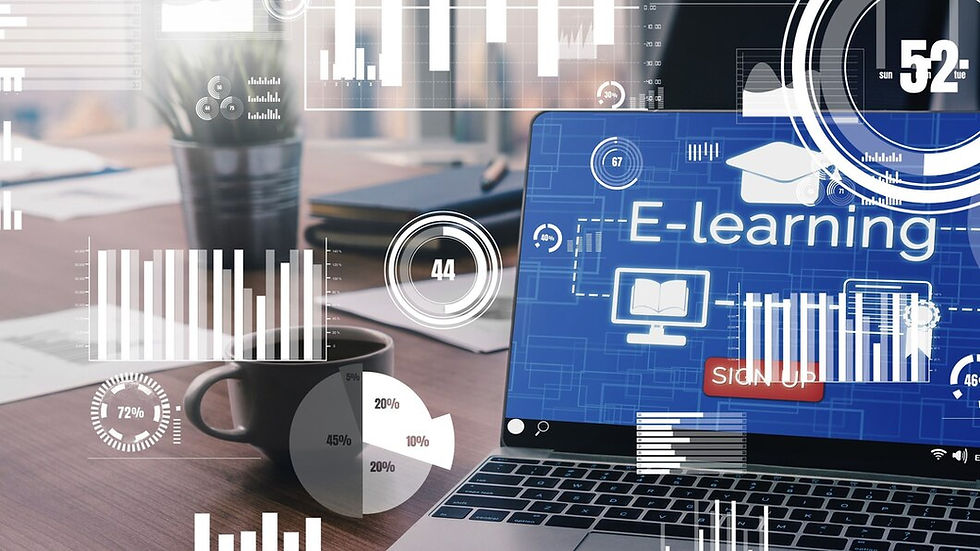Empowering Associations in 2024: Unveiling The 10 eLearning Trends That Define Success
- social08204
- Jan 10, 2024
- 4 min read
Updated: Jul 4, 2025
Learn the top 10 elearning trends using association LMS for empowering associations in 2024. It includes AI, data analytics, microlearning, and more.
The years ahead in association education promise groundbreaking innovations that will dramatically transform professional learning. Here are some of the top e‑learning trends for 2024 which, in our view, will redefine education through association LMS—providing members with more personalized, engaging, and effective learning experiences.

1. Integration of Artificial Intelligence (AI)
Ongoing incorporation of AI to improve learning through intelligent tutoring programs, adaptive learning, and data-driven insights. These could be features in your learning management system (LMS) like artificial intelligence (AI)-powered assessment questions, which let businesses expand their course offerings and streamline the assessment creation process, or AI-generated knowledge checks, which keep learners interested and involved in the learning process.
2. Using Data Analytics to Gain Understanding
In the field of education, data analytics encompasses not only monitoring learner advancement but also determining how well instructional tactics work. Organizations can make well-informed decisions by using learning analytics to find patterns, elearning trends, and correlations in learner data. For instance, data analysis may highlight particular areas in which learners frequently falter, leading teachers to modify their lesson plans or approach to teaching.
3. Microlearning
The development and delivery of content must be carefully considered when implementing microlearning. Content producers ought to concentrate on providing succinct, focused content in interesting formats, such as brief films, infographics, or interactive modules.
4. Microcredentials
Microcredentialing, which is frequently combined with microlearning, needs a strong framework for evaluation and acknowledgment. Establishing precise requirements for obtaining credentials and making sure these micro-credentials meet industry demands are two things that organizations must do. Digital certificates and badges should be respected in the employment market and offer learners real value.
5. Customization
Learning experiences are customized to each learner's preferences, learning preferences, and skill level through personalized learning. Organizations can design flexible learning pathways by utilizing analytics and membership data. Additionally, learners advance at their own pace thanks to adaptive assessments and customizable course recommendations.
6. Collaborative & Social Learning
Features that encourage peer discussion and knowledge sharing should be given top priority on platforms in order to promote collaborative learning experiences. Discussion boards, group projects, and cooperative document editing tools are a few examples of features that platforms may offer. Peer-to-peer feedback opportunities and membership programs are common features of successful collaborative learning environments.
It is essential to create a community based on common interests and objectives. By using gamified components, organizations can promote involvement while praising and rewarding teamwork. This fosters a feeling of community and shared accountability for the educational process.
7. The Application of Gamification
Understanding the psychological underpinnings of motivation is essential to gamification in education. Digital badges, streaks, and leaderboards are examples of elements within the best LMS for associations that appeal to learners' intrinsic motivation by giving them a feeling of accomplishment and acknowledgment. Gamification is the process of enhancing educational content with storytelling and narrative elements to increase engagement and make learning more fun.
Measures like completion rates, participation rates, and knowledge retention rates provide information about how well-gamified elements work. To maximize engagement, organizations can iteratively improve their gamification tactics based on data-driven feedback.
8. Multi-modal Learning
People prefer different things to learn. Businesses should use a hybrid strategy that incorporates methods from online courses, podcasts, videos, and live events. This ensures that content is effective and accessible to a wide audience by meeting the needs of visual, auditory, and kinesthetic learners.
Keeping your instructional content coherent and consistent is crucial even when you are incorporating these different learning modalities. A comprehensive and captivating learning experience is enhanced by effective communication of learning objectives and smooth transitions between modalities.
9. Content Creation Automation
While automation in content creation is becoming more and more common, it's important to find a balance between productivity and creativity. By helping to create standardized materials, AI-generated content tools free up educators to concentrate on more complex tasks like curriculum design and interactive teaching techniques.
Businesses need to make sure that content produced by machines adheres to standards for education, stays impartial, and retains that crucial human element. The assessment of the caliber and applicability of AI-generated educational content still requires human oversight.
10. Assign Soft Skills Priority
The last but not least item on our list for 2024 is emphasizing soft skills. Role-playing games, case studies, and simulations are some examples of this that can help learners gain real-world experience that improves their critical thinking, communication, teamwork, and adaptability.

Reflective learning is further encouraged in soft skills training by including peer and self-assessment. These techniques support an approach to interpersonal skill development that is more experiential and meets the needs of modern workplaces.
Conclusion
In summary, it is evident that education is now a dynamic, adaptive ecosystem rather than a static institution. A new era in education is being ushered in by the incorporation of AI, the application of data analytics, and the focus on individualized, interactive, and game-based learning experiences through association LMS. All learners should look forward to a more meaningful, perceptive, and engaging educational experience by 2024. We're excited to work with you to accomplish that and more!



Comments